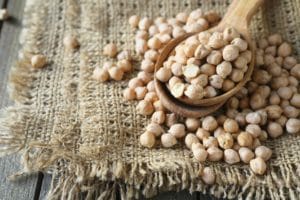 Photo: Getty
Photo: Getty Q. My younger child is allergic to peanuts and our family doctor recently said he should be avoiding chickpeas (which he hasn’t tried) as well. She says there’s a high risk of reaction in peanut-allergic kids. Is this true?
Dr. Sicherer: It is true that there is a “higher” risk of a chickpea allergy in a child with peanut allergy, but I do not agree with a blanket statement that this food should be avoided for everyone with a peanut allergy.
In fact, there is a “higher” risk of egg and milk allergy in a child with peanut allergy, but we do not automatically remove those foods from the diet without additional consideration.
We do not have adequate studies to state the general risk of chickpea allergy among children with peanut allergy. Peanut is a legume and it shares similar proteins with many other beans. However, in a U.S. study performed many years ago, only 5 percent of children with a peanut allergy had allergic reactions to other beans tested.
A tricky problem is that if you use blood or skin tests to beans for a person with a peanut allergy, about half the time the tests are positive even though 95 percent of the patients can eat the beans. The tests are affected by immune responses to shared bean proteins that are not important when it comes to allergic reactions.
Chickpeas, Peas and Lentils
Studies of chickpea and lentil allergy emanating from Mediterranean countries do note a high correlation of allergic reactions among pea, chickpea and lentil. Over two-thirds of children reactive to one of these three, reacted to another of the three.
However, peanut allergy was uncommon in these children. Of note, studies from Europe suggest that lupin/lupine bean may pose a higher risk – about 20 percent – of being an allergen in people with peanut allergy.
The lessons learned appear to be that if a child with peanut allergy has already been tolerating peas, there is a much lower chance of having allergy to chickpea. Conversely, if peas caused a reaction, the risk of chickpea and lentil allergy is quite high.
Individual advice may vary, but if chickpea was already eaten and tolerated, there would be no reason to avoid it because of a peanut allergy. Lastly, a positive allergy test to chickpea in a person with peanut allergy does not prove an allergy. In such a case, a medically supervised feeding (e.g. a food challenge) may be warranted.
Dr. Scott Sicherer is a practicing allergist, clinical researcher and professor of pediatrics. He is Director of the Jaffe Food Allergy Institute and Chief of Pediatric Allergy and Immunology at the Icahn School of Medicine at Mount Sinai in New York. He’s also the author of Food Allergies: A Complete Guide for Eating When Your Life Depends On It.
Submit a Question View all posts by this medical expert.

